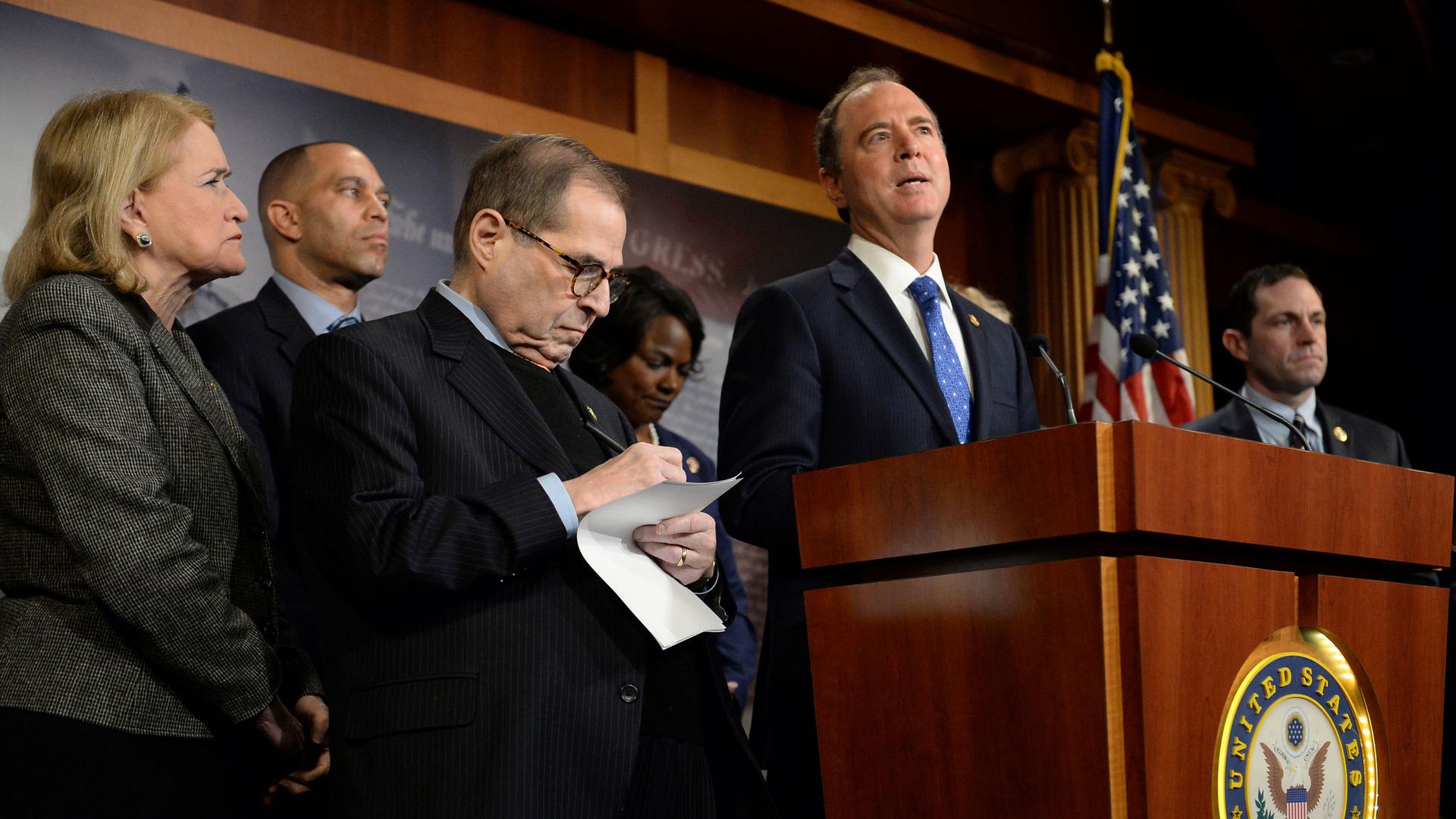Watch live: Trump impeachment trial enters pivotal week as calls for witnesses grow
Rep. Adam Schiff speaks as fellow House Impeachment Managers listen after the impeachment trial of US President Donald Trump ended for the day in Washington, DC, Jan. 25, 2020.
Amid fresh calls on Monday pressuring the US Senate to call former National Security Adviser John Bolton to testify, President Donald Trump’s impeachment trial enters a pivotal week as his lawyers resume their defense. Stream the Senate proceeds live here starting at 1 p.m. ET.
The New York Times cited an unpublished Bolton manuscript as saying that Trump told him he wanted to freeze security aid to Ukraine until its officials helped with investigations into Democrats, including former Vice President Joe Biden, and his son, Hunter Biden.
The elder Biden is a leading Democratic contender to face the Republican president in the Nov. 3 US election. Hunter Biden worked for a Ukrainian energy firm while his father was vice president.
The report, which did not quote the manuscript but cited multiple people describing Bolton’s account, may undercut a key element of Trump’s defense: that there was no quid pro quo when he asked Ukrainian President Volodomyr Zelenskiy to investigate Biden and his son, Hunter Biden, in a July phone call.
Bolton’s lawyer Charles Cooper said in a statement on Sunday that the manuscript had been submitted to the White House for a standard prepublication security review for classified information.
“It is clear, regrettably, from The New York Times article published today that the prepublication review process has been corrupted and that information has been disclosed by persons other than those properly involved in reviewing the manuscript,” Cooper said.
A Bolton aide said he had not given the manuscript to anyone else besides the White House for review.
White House spokeswoman Stephanie Grisham cast doubt on the timing of the report, which was published around the time pre-ordering for Bolton’s book began.
Trump denied the allegations in a series of tweets early on Monday.
“I NEVER told John Bolton that the aid to Ukraine was tied to investigations into Democrats, including the Bidens … If John Bolton said this, it was only to sell a book,” Trump wrote.
Trump’s team has previously said he was well within his constitutional authority to press Zelenskiy to investigate the Bidens as part of what he says was an anti-corruption drive. The Bidens deny wrongdoing.
In only the third presidential impeachment trial in US history, lawmakers argued last week that Trump should be removed for encouraging Ukraine to interfere in the 2020 US election by pressuring its leader to dig up dirt on Biden.
Trump’s defense tried to turn that election interference line against the Democrats in its opening argument on Saturday by warning against removing a president less than 10 months before Americans vote on whether to give him a second term.
The president’s team will continue with his defense on Monday afternoon.
While the Republican-controlled Senate is highly unlikely to remove Trump from office, it is important for him to try to blunt the Democratic accusations to limit political damage to his bid for a second term.
The report drew immediate Democratic demands that the Senate call Bolton as a witness, an issue the 100-member chamber is likely to address later in the week.
The impeachment trial rules provide for a two-step process on whether to subpoena witness and documents, with an initial vote on whether to consider doing so and, if approved, subsequent votes to actually call witnesses or demand documents.
Democrats argue this could allow Republicans have it both ways — allowing them to first vote “yes” on whether to proceed and then vote “no” on actually allowing witnesses or documents.
As a result, vulnerable Senate Republicans could make the case to moderates that they had voted in favor of witnesses in the first vote while avoiding alienating Trump supporters by refusing to actually call any in later votes.
If the Senate called witnesses or demanded documents, the trial could lengthen. If not, the Senate could vote toward the end of the week on whether to remove Trump from office.
If that were to happen the trial could be over before the first US voting contest takes place in Iowa on Feb. 3 and before Trump is scheduled to deliver the annual State of the Union address to a joint session of Congress on Feb. 4.
By Richard Cowan and Karen Freifeld/Reuters
Our coverage reaches millions each week, but only a small fraction of listeners contribute to sustain our program. We still need 224 more people to donate $100 or $10/monthly to unlock our $67,000 match. Will you help us get there today?
